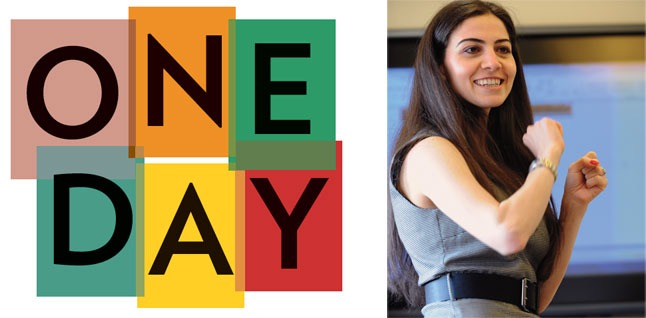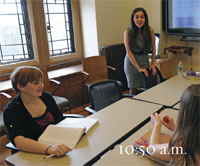
features |
1 > |

One Day with Kifah Hanna, Assistant Professor of Language and Culture Studies
by Mary Howard • Photos by Nick Lacy
A member of Trinity’s faculty since 2009, Assistant Professor of Language and Culture Studies Kifah Hanna,Trinity’s fi rst tenure-track professor of Arabic language, literature, and culture, has helped expand the College’s Arabic program. “While other schools have been cutting their programs, Trinity has been very supportive,” she says. Her signature teaching method — classes conducted almost entirely in Arabic, lots of conversation, and rapid-fi re vocabulary recitations and verb conjugations — is popular and effective with students. On Tuesday, March 13, The Reporter spent the day with Hanna.
 8:30 a.m.
Hanna arrives at her office in Seabury Hall to prepare for her first class of the day.
8:30 a.m.
Hanna arrives at her office in Seabury Hall to prepare for her first class of the day.
She says she’s always had a passion for literature and language. As a child growing up in Syria, Hanna wrote poetry, which her parents once sent to a local journal for publication. But it wasn’t until her graduate studies at the University of Edinburgh in Scotland that her passion took shape in the academic world. “I started teaching Arabic lessons privately,” she says. During that time, Hanna developed teaching techniques that address the challenges non-native speakers encounter with Arabic. “Many of the sounds, most of the grammar, and the cultural landscape are completely new to most students,” she says. “For instance, there are five sounds in Arabic that don’t exist in any Romance language.”
 10:50 a.m. Students
in Hanna’s first class of
the day — Advanced
Arabic II Composition
and Style — are greeted
by their professor with ahlan, “hello” in Arabic.
“This signals leaving
English at the doorstep
and committing to Arabic
fully in the classroom,” says
Stephanie Clemente ’14, an
international studies and
anthropology major.
“I belong to a new school
of teaching language,”
says Hanna. The
communicative approach
to the teaching of foreign
language limits the
teacher’s talk-time and
encourages students to
speak and share in class,
she says.
“She constantly speaks
Arabic to us, even if we
have to answer in English,”
says Christine Ganley ’12,
an international studies
major with a Middle East
concentration.
Hanna asks her students to
quickly recite vocabulary
words and conjugate
verbs, giving them little
time to think. Clemente
says this fast-paced
instruction helped her
master the difficult task
of conjugating verbs. “It
emulates the way people
have a conversation, by
quickly thinking and
translating in their heads.”
10:50 a.m. Students
in Hanna’s first class of
the day — Advanced
Arabic II Composition
and Style — are greeted
by their professor with ahlan, “hello” in Arabic.
“This signals leaving
English at the doorstep
and committing to Arabic
fully in the classroom,” says
Stephanie Clemente ’14, an
international studies and
anthropology major.
“I belong to a new school
of teaching language,”
says Hanna. The
communicative approach
to the teaching of foreign
language limits the
teacher’s talk-time and
encourages students to
speak and share in class,
she says.
“She constantly speaks
Arabic to us, even if we
have to answer in English,”
says Christine Ganley ’12,
an international studies
major with a Middle East
concentration.
Hanna asks her students to
quickly recite vocabulary
words and conjugate
verbs, giving them little
time to think. Clemente
says this fast-paced
instruction helped her
master the difficult task
of conjugating verbs. “It
emulates the way people
have a conversation, by
quickly thinking and
translating in their heads.”
|
| 1 > |
